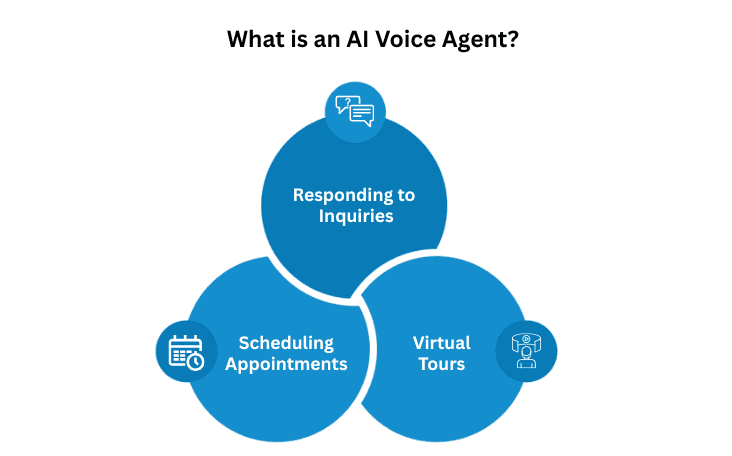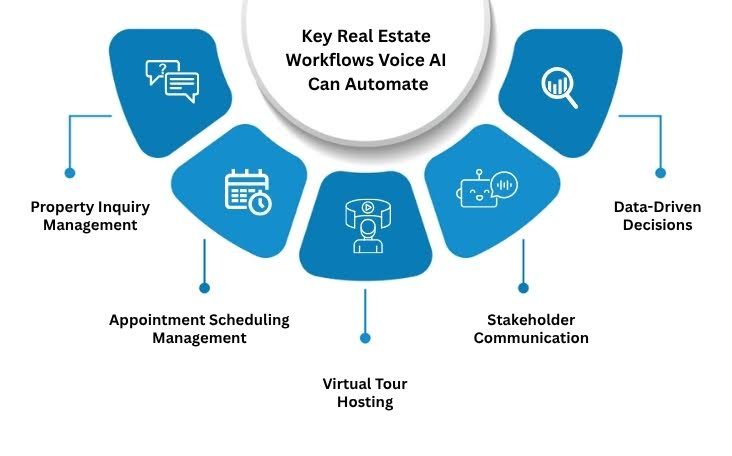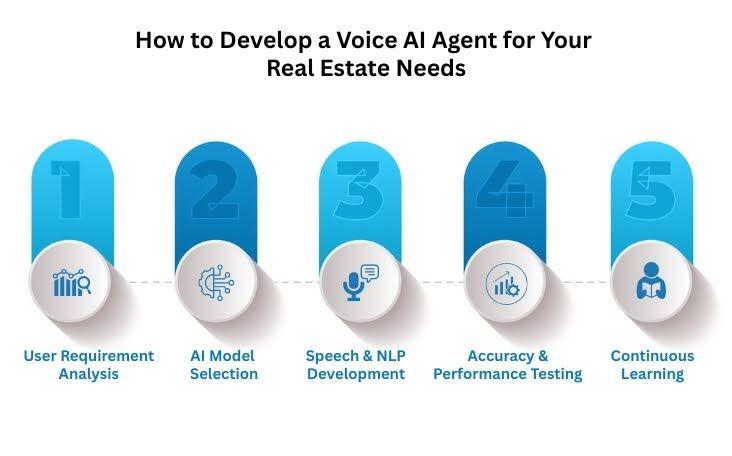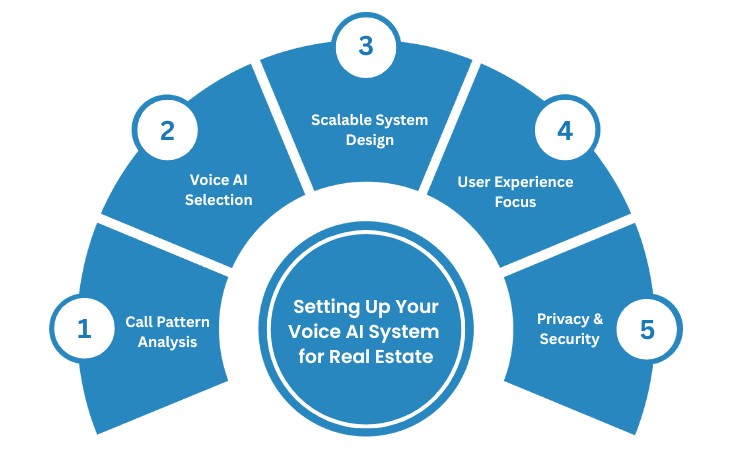Learn how AI voice agents can handle property inquiries, scheduling, and virtual tours in real estate, boosting efficiency and enhancing customer engagement.

Akshat Mandloi
Updated on
January 27, 2026 at 4:59 PM
Real estate teams deal with a constant stream of questions, viewings, and follow-ups — most of them routine, but still time-sensitive. A potential buyer calls to ask if the property’s still available. A renter wants to reschedule a tour. Another client needs directions for a virtual walkthrough. These are important touchpoints, but they don’t always need a human on the other end.
That’s exactly where AI voice agents come in. They’re designed to handle everyday interactions — like answering property inquiries or confirming appointments — so your team doesn’t have to. And because they run 24/7, they help you avoid missed leads, reduce back-and-forth, and respond faster without stretching your staff thin.
In this blog, we’ll look at how real estate businesses are using AI voice technology to automate scheduling, qualify leads, and even walk clients through virtual property tours — all while keeping the experience personal and on-brand.
TL;DR
24/7 Inquiry Handling: Voice agents can instantly respond to buyer and renter questions around the clock, helping you avoid missed leads and improve response times.
Automated Appointment Scheduling: From booking site visits to sending reminders, voice AI handles scheduling tasks seamlessly without requiring human follow-ups.
Virtual Tour Guidance: Voice agents can guide users through virtual property tours with context-aware narration and answers, offering a real-time, interactive experience.
Customizable for Your Workflow: Whether you're a small agency or an enterprise firm, voice AI can be tailored to match your process, property types, and customer preferences.
Improved Efficiency & Client Experience: By automating repetitive tasks, voice agents free up your team to focus on more strategic work while maintaining a smooth and responsive client experience.
What is an AI Voice Agent?

An AI Voice Agent is an automated system that uses artificial intelligence to engage in voice-based conversations with humans. It can listen, understand, and naturally respond to spoken language, enabling it to handle a wide range of tasks.
These agents are powered by advanced technology, allowing them to process and interpret language, making their responses sound conversational and human-like. In real estate, AI Voice Agents can play a crucial role in streamlining operations by handling tasks such as:
Responding to Property Inquiries: They can instantly answer questions about property availability, pricing, and features.
Scheduling Appointments: These agents can schedule property viewings or consultations, eliminating the need for back-and-forth emails or phone calls.
Virtual Tours: AI Voice Agents can guide prospective buyers or renters through virtual property tours, offering detailed information along the way.
By automating these repetitive tasks, AI Voice Agents free up real estate professionals to focus on more personalized and high-value client interactions.
Now that we’ve covered what an AI voice agent is, let’s look at why it’s becoming such a valuable tool in the real estate world.
Also Read: Voice AI in Real Estate: Revolutionizing Property Transactions
Benefits of Voice AI in Real Estate
In the real estate industry, where time is of the essence and competition is fierce, voice AI provides a clear advantage. It's no longer just a luxury but a core tool for modern agencies and platforms. Here's how it makes a real difference:
Handle More Calls Without Increasing Overhead
Voice AI lets your real estate business scale conversations without scaling your headcount. These agents manage high volumes of inbound and outbound calls, respond to common questions, qualify leads, and update your CRM — all without human intervention.
Automate Appointment Scheduling and Virtual Tours
Scheduling property visits and virtual tours does not have to be a manual task. Voice AI can handle this automatically, sending reminders and confirmations without human intervention, making the entire process seamless.Boost Lead Conversion and Response Time
With 24/7 availability, voice AI ensures that no lead is left unanswered. Immediate responses to inquiries increase the chances of converting leads into clients, even outside regular business hours.Personalized Follow-Ups and Multilingual Support
Voice agents can adjust their communication based on user behavior, ensuring that each conversation feels personal. Plus, they can speak multiple languages, making them ideal for global clients and international investors.Generate Better Data and Insights for Smarter Decisions
Voice AI handles interactions, collecting and analyzing valuable data. From tracking buyer interest to providing real-time property insights, these tools help businesses make more informed, data-driven decisions.
As businesses look for better ways to engage with customers and operate efficiently, voice AI is playing an increasingly significant role.
Looking to reduce overhead, boost lead conversions, and respond to every client, day or night? Smallest.ai offers multilingual, accent‑adaptive voice agents that seamlessly handle property inquiries, qualify leads, schedule viewings, and send reminders while integrating with your CRM and lead-scoring tools.
Also Read: What Are AI Phone Agents and How They Work
Understanding the benefits is one thing, but how does this all play out in day-to-day real estate operations? Let’s break it down.
Top Use Cases of Voice AI for Real Estate Teams

Voice AI is changing the way real estate businesses operate. Here’s how AI voice agents are optimizing key real estate functions:
1. Managing Property Inquiries & Lead Qualification
Voice AI agents provide immediate answers to property inquiries and pre-qualify leads by gathering essential information such as budget, location preferences, and timelines. This allows agents to focus on high-priority prospects.
Instant Responses: Clients get immediate, accurate property details.
Lead Qualification: AI filters leads based on their preferences and readiness to move forward.
Increased Engagement: Clients are quickly and efficiently engaged, with no delays.
Example:
A potential buyer calls about a property. The voice AI responds to their questions and gathers essential details about their price range and timeline, ensuring the agent follows up with the most relevant leads.
Turn every inbound call into a qualified lead. Smallest.ai voice agents engage prospects instantly, gather crucial buyer details, and sync it with your CRM so your team focuses on closing, not chasing. Try Smallest.ai for real estate lead qualification.
2. Streamlined Appointment Scheduling & Attendance Management
Voice AI automates the appointment scheduling process, integrating with agents’ calendars to book appointments seamlessly. It also reduces no-shows by sending timely reminders and follow-up messages to clients.
Automated Scheduling: AI schedules appointments without human intervention.
Appointment Reminders: AI sends reminders and confirmations to reduce no-shows.
Efficient Calendar Management: Reduces administrative burden by handling scheduling logistics.
Example:
A client schedules a property viewing, and the AI integrates the appointment into the agent’s calendar. It sends a confirmation and a reminder an hour before the appointment, ensuring both the client and agent are on the same page.
3. Conducting Interactive Virtual Tours
Voice AI facilitates remote property tours by guiding clients through properties virtually, answering their questions, and providing detailed descriptions in real-time.
Interactive Tour Guides: Clients are engaged through a guided, virtual property tour.
Real-Time Information: AI answers specific questions about property features and location.
Engagement: Ensures a personalized experience for clients even when they are far away.
Example:
A buyer from another country explores a property through an interactive virtual tour, asking AI questions about room sizes and nearby amenities, receiving instant responses that help them make an informed decision.
Scale virtual tours without losing the personal touch. With Smallest.ai, real estate teams can offer interactive, AI-guided property tours that answer questions in real-time. Ideal for remote buyers or international clients. Book a demo to explore how Smallest.ai enhances property tour experiences.
4. Communication Among Stakeholders
Real estate transactions involve various parties, such as agents, contractors, investors, and clients, all of whom need up-to-date information. Voice AI ensures clear, real-time communication between stakeholders, reducing delays and improving coordination.
Centralized Communication: AI ensures consistent and timely updates to all involved parties.
Real-Time Alerts: Updates regarding project timelines, property status, or meeting changes are sent instantly.
Improved Coordination: AI ensures no one misses critical updates, keeping everyone aligned.
Example:
A contractor informs the agent of a delay in the property development schedule. AI immediately notifies both the agent and the investor, ensuring everyone is aware of the change without requiring a manual update.
5. Data Insights for Smarter Decision-Making
Voice AI collects valuable data from client interactions and inquiries, which real estate businesses can analyze to make more informed decisions. The data helps refine marketing strategies, understand client preferences, and improve sales tactics.
Behavioral Tracking: AI tracks interactions to understand client preferences.
Actionable Insights: Real-time data helps agents adjust strategies and improve client engagement.
Improved Marketing: Data-driven insights help target the right audience more effectively.
Example:
A real estate agency uses AI to track client preferences and finds that homes with energy-efficient features, like solar panels, generate more inquiries, even though they aren't top listings.
The agency then adjusts its marketing strategy to highlight these eco-friendly properties, resulting in improved client engagement and more inquiries from environmentally conscious buyers.
By integrating AI into their operations, real estate businesses can enhance client engagement, reduce administrative workload, and make data-driven decisions that improve their bottom line.
Also Read: Top AI Platforms for Phone Calling in 2025
If these everyday applications sound useful, you might be wondering how to build a voice agent that fits your business. Here’s how to get started.
How to Develop a Voice AI Agent for Your Real Estate Needs

Creating a voice AI agent for your real estate business requires a structured approach that focuses on user needs, the right tools, and ongoing improvements. Here’s a guide to help you develop and implement an effective voice AI system.
1. Plan and Understand User Requirements
Define the Purpose: Begin by identifying the tasks the voice agent should handle. In real estate, this might include managing support calls, assisting with service requests, or helping internal teams.
Understand Your Users: Get a clear picture of who will interact with the AI agent. What are their preferences and current workflows?
Set Clear Goals: Define what you want to achieve, whether that’s reducing manual work, speeding up response times, or improving customer satisfaction.
2. Select the Right AI Models
Choose the Right Tools: Utilize Natural Language Processing (NLP) to understand customer queries and generate natural, context-aware responses. Combine this with speech recognition to accurately transcribe spoken language, and text-to-speech technology to deliver those responses in a clear, human-like voice.
Tailor for Real Estate: Opt for AI models like Smallest.ai that are designed to understand the specific language and tasks common in the real estate industry. This ensures your voice agent can effectively handle real estate-specific jargon, client behaviors, and property-related inquiries, making interactions feel more personalized and efficient.
3. Build Speech Recognition and NLP Capabilities
Train the Agent: Ensure your agent understands real estate terminology and can handle various accents and follow-up questions. Use real-world customer data to train the system effectively.
Handle Complex Interactions: Implement features that allow the agent to manage interruptions, provide clarifications, or escalate conversations when needed.
4. Test for Accuracy, Performance, and Reliability
Test in Real Situations: Evaluate how well the agent performs in live scenarios. Test how quickly it responds, how accurate it is, and how it manages high-volume calls or stressful situations.
Gather Feedback: Use feedback from your team and customers to refine and improve the AI, ensuring it meets your business needs before full-scale implementation.
5. Keep Learning and Improving
Monitor Performance: After the agent goes live, track its usage and look for areas where it may not meet expectations.
Continuous Updates: Regularly retrain the system with new data, tweak conversation flows, and update it to ensure it stays effective and relevant.
When built thoughtfully, a voice system can become a natural extension of your team, helping you work smarter, respond faster, and serve clients better.
Once you have a basic system in place, it’s important to think about how to set it up properly. A few thoughtful steps can make a big difference in how well your voice AI performs.
Best Practices for Setting Up Your Voice AI System for Real Estate

When implementing a voice AI system in real estate, it's crucial to consider both the unique needs of your business and the technology that will best support those needs.
1. Analyze Your Current Call Patterns
Analyze Call Patterns: Track peak call times and volumes to understand when your team is most overwhelmed.
Identify Common Customer Inquiries: Identify the most frequently asked questions and requests from clients, enabling you to prioritize automation in these areas.
2. Choose the Right Voice AI Platform
Natural Voices: Make sure the AI uses a voice that reflects your brand’s tone, providing a seamless experience for your clients.
Customizable Flows: Select a platform that lets you design tailored conversation flows for specific tasks like new buyer inquiries, rental applications, and more.
CRM Integration: Ensure the system integrates with your current CRM for smooth data flow and tracking.
3. Build a Scalable and Flexible System
Consider Scalability: Select platforms that can scale with your business, accommodating increased call volumes as your real estate business grows.
Support for Multiple Use Cases: Ensure the voice agent can adapt to different tasks, from property inquiries to scheduling and follow-ups, providing flexibility as your needs evolve.
4. Focus on User Experience
Design for Real User Behavior: Keep responses short and easy to follow. Long voice replies can be frustrating for users, so ensure interactions are efficient and straightforward.
Consider Environmental Factors: Voice agents should function well in noisy or shared environments, which are common in real estate offices, with features such as noise-canceling and privacy protection.
Provide Multiple Channels: Offer users the option to switch between voice and other communication channels as needed, ensuring they can select the most convenient method.
5. Ensure Privacy and Security
Protect Sensitive Data: Implement encryption, access controls, and compliance checks to protect user data, especially considering the sensitive nature of real estate transactions.
Clear Data Usage Policies: Be transparent about how voice data is collected, stored, and used, ensuring clients are aware of your security measures.
Also Read: 10 Best AI Voicemail in 2025
By following these steps, your real estate business can develop and implement a voice AI system that streamlines operations and improves customer satisfaction.
Conclusion
Managing property inquiries, scheduling appointments, and guiding virtual tours can be time-consuming and overwhelming for your real estate team. The constant back-and-forth with clients can lead to delays, missed opportunities, and unnecessary stress for your agents.
A voice system that is tailored to your real estate business can help streamline everything from answering property inquiries to scheduling appointments and guiding virtual tours.
With Smallest.ai, you can implement a voice solution designed to reduce the burden on your team. It helps manage customer interactions more efficiently, allowing your agents to focus more on closing deals and building relationships.
Ready to make a change? Book a demo today and see how easy it can be to boost your team’s productivity and offer your clients a more seamless experience.
FAQs
1. Can voice agents handle property inquiries effectively?
Yes, they can. Voice agents are trained to respond to common property-related questions such as availability, pricing, features, and location. They provide quick and consistent answers, helping clients get the information they need without delays.
2. How does voice technology help with scheduling viewings?
Voice systems can book appointments, send reminders, and even reschedule viewings if needed without human intervention. They integrate with your existing calendar tools to ensure everything runs smoothly.
3. Do voice agents support virtual property tours?
Yes, they can guide clients through virtual tours by offering real-time descriptions and answering questions during the experience. This adds a personal touch, even when buyers are viewing properties remotely.
4. Will using a voice agent reduce personal connection with clients?
Not necessarily. Voice agents can free up your team from routine tasks, allowing them to focus more on meaningful interactions and personalized service where it matters most.
5. Can these systems support non-English speaking clients?
Many voice systems offer multilingual support or can be customized for different languages. This helps real estate businesses engage more comfortably with international buyers or clients from diverse backgrounds.


